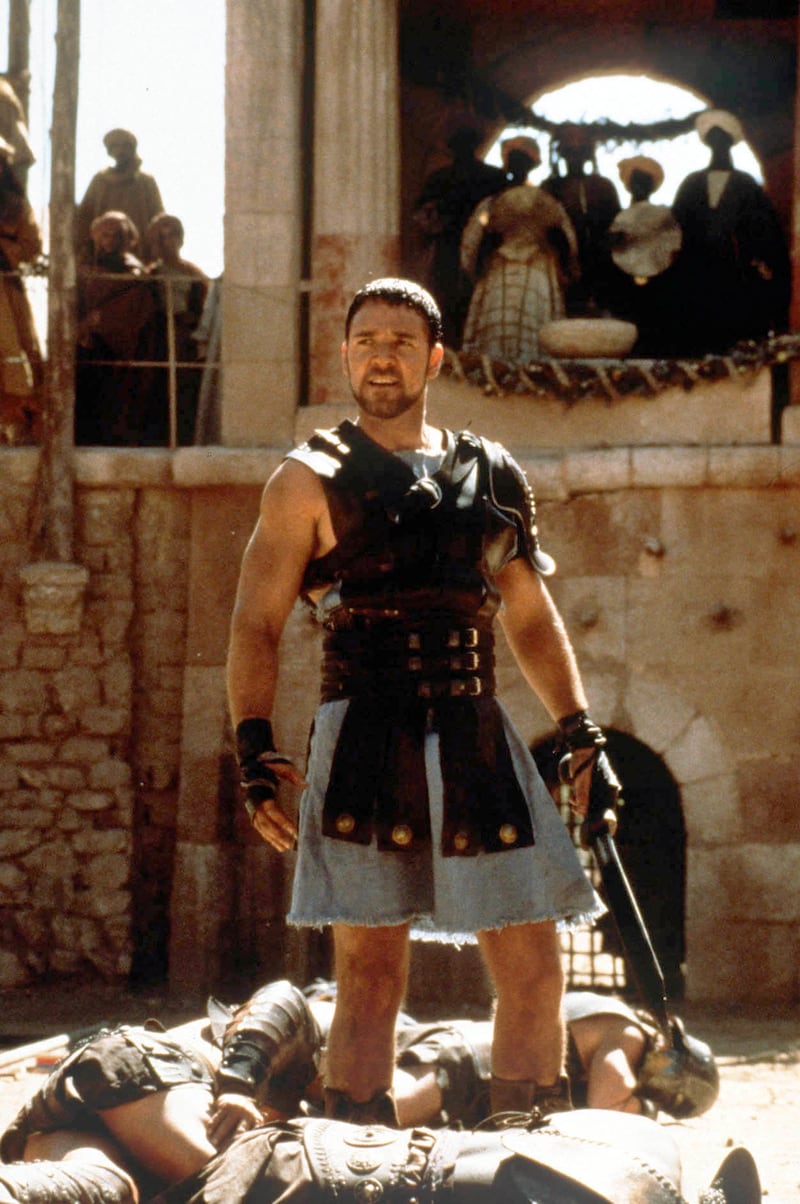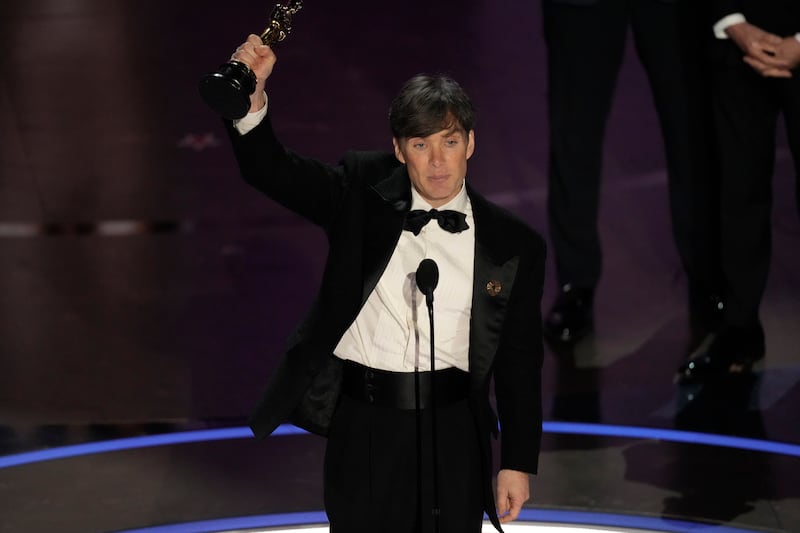IT’S been 24 years since Roman general turned unwilling gladiator, Maximus Decimus Meridius (Russell Crowe) finally exacted deadly, sword-based revenge on corrupt Emperor Commodus Aurelius (Joaquin Phoenix).
Commodus enslaved Maximus, murdering his family just for badness (having already suffocated his own father, Emperor Marcus Aurelius (Richard Harris), whom the army man was unswervingly loyal to) in order to ascend to the throne, thus squashing his old man’s secret ‘dream of Rome’ in which power is handed back to its people.

Mortally wounded by Commodus, when last we saw Maximus he was reunited with late his wife and son in the Elysian Fields of the afterlife. His tale seemed fairly done and dusted, but Gladiator director Ridley Scott had other ideas: Gladiator II - or ‘GladIIator’ to give this belated sequel its proper, syntax-scrambling onscreen title - begins with an impressive animated title sequence revisiting key moments from the first film before picking up the story two decades down the line.
The Roman conquest is still in full, blood-thirsty swing in North Africa under a pair of power-crazed brothers, Emperors Caracalla and Geta (Fred Hechinger and Joseph Quinn), who have scant regard for the welfare of the rapidly growing populous in their ever-expanding realm.
Battle-weary General Marcus Acacius (Pedro Pescal) is their highly-decorated instrument of war, and the film opens with his troops laying siege to a coastal town in Numidia, the final North African stronghold of independence, via a fleet of surprisingly shonky looking CGI Roman galleons.

Oddly, despite a bazillion dollar budget which has facilitated the incredible practical sets and otherwise sky-high production values very much in evidence on-screen throughout Gladiator II, there are still a couple of jarring special effects in evidence, a through-line from the first instalment which at least had the excuse of being made during the technology’s relative infancy.
After killing hundreds and rounding up the survivors as prisoners of war to be returned to Rome as slaves, one of these enraged, newly widowed and bent-on-revenge Numidian POWs is the ‘threat’ of a new Roman republic personified: he’s actually Lucius Verus (Paul Mescal), the son of Commodus’s sister, Lucilla Aurelius (Connie Nielsen), from the first film, who is now stepping out with General Acacius, the focus of Lucius’s hatred.
In the original Gladiator, it was implied that the then 12-year-old Lucius (Spencer Treat Clark, glimpsed here in flashback) was actually fathered by Maximus - the gladiator he idolised, much to his uncle Commodus’s fury - and the sequel confirms him as the offspring of Rome’s now legendary ‘rebel gladiator’ who gave his life in the cause of empowering its people.
It is also explained, via flashback, that the young heir to the throne was sent into protective exile to shield him from a bloodthirsty scramble for power. Conveniently, the adult Lucius initially seems to have forgotten huge chunks of his childhood in nobility, or has perhaps simply repressed it all out of spite for the mother who ‘abandoned’ him.

Bits and pieces gradually start to come back to him, though, once he’s been trained up as a gladiator by Macrinus (Denzel Washington), a former slave who’s now a wealthy and ambitious Roman arms dealer and political fixer with his Machiavellian sights set on infiltrating the Emperors’ elite inner circle.
Maximus has become a near mythical figure of inspiration for those who fight for their lives and a chance to buy their freedom at the Colosseum, where Lucilla still sits in the royal box to observe the carnage - which, this time around, ups the man vs beast ante from the tigers of the first picture to a veritable menagerie including terrifying looking CGI baboons, warriors mounted on giant CGI rhinos, and massive CGI sharks.

Yes, you read that right: Gladiator II fills the famous amphitheatre with seawater - apparently historically accurate - and a school of ferocious finned man-eaters (possibly somewhat less historically accurate, because Ridley Scott) for one of the film’s bravura action set-pieces in which Lucius and his fellow swordsmen must re-enact a famous naval battle utilising actual Roman galleons.
There’s a moment of recognition for Lucilla when she spots her long-lost son mimicking Maximus’s signature moves, like rubbing the dirt of the arena floor on his hands and dispatching opponents with flashy double-handed decapitation chops.
It’s hopefully not too much of a spoiler to reveal that Lucius eventually embraces his complicated parentage, resolving to follow in the dusty, bloodstained footsteps of the father he barely knew by taking down the man who enslaved him and hopefully the entire Empire along with him.
“Rome has taken everything from me - but I will have my vengeance,” he declares.

That’s supposed to be the main plotline in the David Scarpa and Peter Craig-penned Gladiator II, effectively echoing the vengeance-based narrative of its Oscar-winning predecessor. However, there is plenty more going on in the sequel beyond the arena in terms of Rome’s murky political machinations, including the carefully calculated rise to power of Lucius’s master, Macrinus, which we learn is also motivated by revenge.
Denzel Washington treats this supporting role like he’s the film’s lead character, going as ‘big’ as he dares in many scenes but also conveying Macrinus’s inherent quick-thinking pragmatism with subtle shifts of facial expression and body language. It’s a command performance that underlines why he’s still one of cinema’s top stars.
As for ‘our Paul’, Lucius is initially a taciturn brooder whose genetically-inherited propensity for leadership is gradually awakened in the arena: when he does speak, it’s with an English-accented voice that’s presumably a tip of the laurel-leaves to his screen dad: the Co Kildare actor’s newly buffed-up physique certainly makes Lucius look like a proper ‘unit’ who could probably best Russell Crowe’s Maximus in an arm-wrestle at the very least.
The Co Kildare actor’s newly buffed-up physique certainly makes Lucius look like a proper ‘unit’ who could probably best Russell Crowe’s Maximus in an arm-wrestle at the very least
It’s precisely the kind of measured, internalised performance with which Mescal has made his name as an actor, and it suits a character who is less given to speechifying and grandstanding than auld Maximus ‘Are you not entertained?’ Meridius.
Of course, this means people are unlikely to still be quoting Lucius in 24 years time, though there are still a couple of memorable lines in there which might merit memefication.

Mescal also convincingly conveys the grief-fuelled rage that makes Lucius so formidable in combat during the film’s many excitingly staged fight/battle scenes (including one where he bites a baboon) which are realised to a typically high Ridley Scott standard, acquitting himself well in his first action hero role.
Pedro Pascal sells his jaded general well, and there are lots of good supporting turns from the likes of Tim McInnerny, Alexander Karim and a returning Derek Jacobi. We could probably have lived without Matt Lucas as the Colosseum’s campy master of ceremonies though, which is guaranteed to pull a lot of viewers (at least on this side of the Atlantic) ‘out’ of the film momentarily.
While it’s a flashier, flabbier affair than the lean, effortlessly powerful Gladiator, this belated sequel still manages to be an enjoyable, visually rich return to the world we last visited 24 years ago despite the extra weight of plot it’s burdened with.
Did Gladiator need a sequel? Not really. Will you be entertained by it? Absolutely.
Rating: 4/5
Gladiator II (Certificate 15, 148mins) is in cinemas from Friday.








